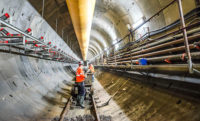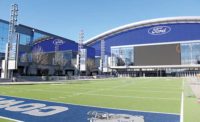About 15 years ago, contractor Allan Myers suffered two tragic on-the-job accidents in the same year—one was fatal, the other resulted in serious injury. Ever since, the family-owned Pennsylvania firm has been on a crusade to improve not only its own safety standards, but those for the industry, too. “I just couldn’t look in the mirror and be proud of myself and my leadership if I didn’t do everything I could to change our company and our culture,” says Ross Myers, the firm’s chief executive. “I wanted to be able to give back and pay it forward.”
Seeking guidance from what Myers calls the “most dangerous industry in the country,” Myers looked to petrochemical companies. “If they have an accident, 1,000 people can get injured,” Myers says. “They have a totally different mindset for what’s palatable.” Myers says he learned how to “win the hearts and minds of people to get them to believe that they will get hurt if we don’t all work together.”
Today, Allan Myers—which ranks No. 1 in the transportation sector of ENR MidAtlantic’s Top Contractor survey with $574.9 million in regional revenue—boasts an 0.76 OSHA recordable incident rate. The company traces that strong record to a safety campaign that focuses on its craft workers as its “backbone” and says sending all of its workers home safe each night is the least it can do to show them “dignity and respect.” Ross Myers also co-chaired National Safety Week this year and helped launch the American Road & Transportation Builders Association Safety Certification for Transportation Project Professionals Commission last year. ARTBA spokesman Matt Jeanneret says Myers is “the most passionate and eloquent advocate for safety I’ve seen.”
The firm says its approach to safety also serves as a recruiting tool, by fostering an injury-free culture workers want to join. Company officials also say the more than 2,000 craft and management employees are a crucial resource as construction’s labor force continues to tighten.
The fourth-generation family-owned business is vertically integrated, with quarries and asphalt plants. Much of the material those facilities produce is used on Allan Myers’ projects. Company officials say that gives the firm an edge in operational synergies, schedule, quality and cost. Since 2014, Myers has expanded the number of asphalt plants it operates by nearly 50%, to 16 this year. Working entirely in the MidAtlantic, the firm has six offices. It is adding a Chesapeake, Va., outpost and a new asphalt plant on the same site. Transportation work represents 76% of the firm’s revenue.
Myers ranks No. 9 in this year’s ENR MidAtlantic Top Contractor survey with revenue of $754.07 million, up one spot from last year when it reported revenue of $629.78. The firm also climbed to No. 105 on ENR’s nationwide 2017 Top 400 Contractors list, from 115th the previous year.
The firm also contributes to the community. In addition to giving to several local and national charities, Ross Myers started the Allan C. Myers Memorial Scholarship at Montgomery County Community College. Ten years ago, Ross Myers helped found the Myers-Lawson School of Construction at Virginia Tech, his alma mater.
For all these reasons, ENR MidAtlantic named the firm its 2017 Contractor of the Year.
Ross Myers’ three sons, Brock, 42, Aaron, 40, and Seth, 37, all work at the company. “You’re always talking to folks who are, literally, completely invested in the work and have ownership,” says Tony Mawry, a partner at design firm Wallace Montgomery & Associates LLP, which in six years has worked with Myers on seven jobs totaling about $250 million. “That makes a big difference when you are teaming up with folks,” he added.
In 1939, father-and-son dairy farmers Allan A. Myers and Allan C. Myers sold six cows to pay for a 1939 Ford dump truck to transport stone from a local quarry. They named the new hauling company Allan A. Myers & Son. After Allan C. Myers returned from World War II—during which he was assigned to a construction battalion that helped build, and rebuild, Pearl Harbor—he convinced his father to start a new venture—investing in a bulldozer to launch a construction company.
By the time Allan C.’s son, Ross, joined the firm in the 1970s, the 25-employee company was paving driveways and small parking lots. Ross says he had a pact with his father “that if we made money one year he’d let me try something new the following year, and that was a good way to learn. We built a little bridge, a small pumping station. We started laying pipe and moving dirt.”
In 1983, Ross bought the company from his father, who was elected a Montgomery County commissioner. Between 1998 and 2015, the firm made five acquisitions outside Pennsylvania, including three quarries and six asphalt plants, and launched American Infrastructure and Independence Construction Materials. In 2015, the firm rebranded as Allan Myers. It now owns 1,700 pieces of machinery that can be driven or operated, including 199 more dump trucks than it owned in 1939.
The company says it aims to attract the best and brightest local college grads and prides itself on promoting from within, including many hourly craft workers who have become salaried field managers. For example, Christian Torres, 33, started as a carpenter six years ago and was recently promoted to concrete foreman. “I actually get a bonus, too,” he says. “I never got anything like that.”
Coming Home
While Ross Myers’ sons grew up working for him, sweeping floors and working on road crews, he also required all three to work for other firms for five years before they could join the family business in professional positions.
For example, in 2004, Aaron Myers was working for Skanksa on the $550-million Cooper River Bridge in Charleston, S.C., when he told his father he was ready to come aboard the family firm. Weeks passed until Aaron’s phone finally rang while he was standing on a trestle high above the Cooper River. “It was probably a few months, long enough to make me wonder,” he remembers. “It was one of those life-defining moments.”
Ross Myers says he wanted to wait until he had the right job opening before he hired Aaron. The job was on the firm’s first design-build contract, a $30-million project to build family housing at Marine Corps Base Quantico in Virginia. Design-build contracts now account for up to 20% of Allan Myers’ work each year. Aaron Myers runs the firm’s Virginia operations; Brock is in charge of the Pennsylvania market; and Seth heads the business development and marketing efforts.
Ross Myers, 67, says he’s “shocked” that his sons work for him because he encouraged them to follow their own paths. “I joked, ‘If it’s legal and you love it, I’m good,’ ” he says. He also says working with his sons is “the best thing in the world 29 days out of 30,” and “the other day I’m the dad and they’re the sons.”
Aaron, Brock and Seth Myers aren’t on the firm’s five-person executive committee, but Ross Myers says his succession plan will include a mix of family and non-family executives. Aaron Myers says he and his brothers want what’s best for the firm first. “The fact that we do this together really brings us closer,” he says.
Ross Myers doesn’t know exactly when he’ll quit, but he says he won’t leave to become a politician, as his father did. “I love what I’m doing, I’m blessed with good health,” he says. “The next five to 10 years in our company are going to be remarkable, and I want to make sure I’m around for them.”
Sidebar: Allan Myers Focuses on Self-Performing Work
The Worcester, Pa.-based company has a workforce of more than 2,000 craft and management professionals, an inventory of 1,700 pieces of equipment that can be driven or operated and owns quarries and 16 asphalt plants. Current and past projects include:
‘Transform I-66’ in Northern Virginia:
The $2.3-billion project, scheduled to begin next year, is the firm’s largest to date. It includes a partnership between Virginia’s Dept. of Transportation and Dept. of Rail and Public Transportation and I-66 Express Mobility Partners, a private-sector consortium of Cintra, Meridiam, Ferrovial Agroman US and Allan Myers.
The design-build project includes 22.5 miles of new express lanes alongside three regular lanes. Express lanes will be available to drivers who pay a toll. Vehicles with three or more people can travel for free. The project also includes new bus service and transit routes, new and expanded park-and-ride lots providing access to the express lanes and more than 4,000 new park-and-ride spaces. Interchange improvements, including auxiliary lanes between interchanges, aim to enhance safety and reduce congestion.
I-64 Segment II Design-Build:
One of only two highway projects on ENR MidAtlantic’s Top Projects list this year, the job includes: widening I-64 to three lanes from two in each direction with a 12-ft-wide paved shoulder; four twin-bridge widenings, including one over a CSX rail line; and a single vehicular bridge widening to carry I-64 eastbound over the existing Merriman Trail.
Baltimore-Washington International Airport Runway 15R-33L Pavement Rehab:
This large, multiphase project required massive earthwork, extensive utilities construction and relocation and a challenging, orchestrated paving operation that combined many company resources.
The project had two separate contracts. The initial contract work, which required 12 months to complete, called for moving nearly 500,000 cu yd of soil, much of it for a new embankment next to the airport’s longest runway.








Post a comment to this article
Report Abusive Comment